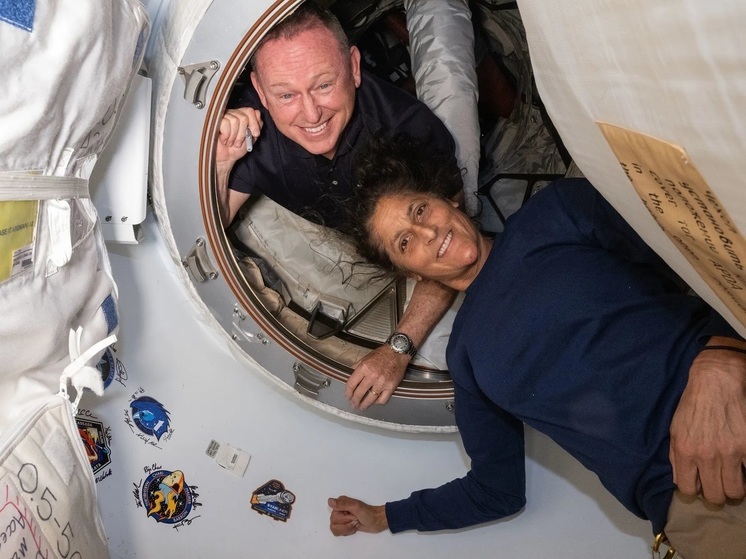Long-term stay in space has dire consequences for health
NASA astronauts are facing fatal, «life-changing» changes in their bodies after being stranded in space by a faulty Boeing Starliner space capsule.

NASA astronauts stranded in space face life-changing risks if their stay on the International Space Station (ISS) is extended beyond 2025, experts warn.
As the Daily Mail recalls, Boeing's faulty Starliner space capsule carried Barry «Butch» Wilmore and Sunita Williams to the ISS in June for what they thought would be a few days, but this week the ill-fated crew received news that they might not return home until next year.
Many studies have shown that long-term space travel can lead to bone density loss, muscle atrophy, intense radiation exposure, vision impairment and other serious health problems.
Astronauts also undergo varying levels of training depending on the length of their mission, including medical tests that suggest Wilmore and Williams are not ready for the challenges ahead.
As one expert told DailyMail.com: «The longer you're in space, the more things change.»
Technical issues with Boeing's Starliner spacecraft have left the astronauts stranded on the ISS for more than two months, despite their scheduled return on June 14.
An engine failure and helium leak on the Starliner prompted NASA and Boeing to keep two astronauts in orbit longer amid concerns that the spacecraft's return could end in disaster.
But the crew now faces another risk: that their bodies could begin to break down.
«In general, almost all of the changes we see over the course of human spaceflight, physiologically, are dose-dependent,» Rachel Seidler, a professor of applied physiology and kinesiology at the University of Florida, told DailyMail.com. «The longer you're up there, the more changes there are — at least up to a point.»
On the ISS, gravity is only about 90 percent of Earth's, the Daily Mail notes. Living in reduced gravity means the body's bones and muscles don't work as hard as they should, leading to significant loss of bone density and muscle atrophy.
«Astronauts experience accelerated bone loss at an alarming rate — about 12 times faster than severe osteoporosis on Earth,» Kyle Zagrodzki, founder and CEO of the Bone Health Clinic, told Newsweek. «Osteoporosis increases the risk of fractures, often resulting in life-changing injuries. Hip fractures are a serious problem because they can rob a person of their independence and increase their risk of death.»
Additionally, according to the European Space Agency, astronauts can lose up to 50 percent of their muscle mass during long-term space flights. This, the Daily Mail writes, can negatively affect their ability to perform heavy physical work both during and after the flight, as well as cause pain and discomfort.
Low gravity even changes the shape and function of astronauts' hearts. According to NASA, in space, the heart changes from an oval shape (like a water-filled balloon) to a round ball (like one filled with air).
The muscles that contract blood vessels also atrophy during long-term space flights, meaning they can't control blood flow either.
Astronauts can lose up to 50% of their cardiovascular endurance during a long space mission, one study found, the Daily Mail notes. Additionally, as fluids in the body move upward during spaceflight, this can cause problems with vision, cognition, balance and coordination, Seidler told DailyMail.com.
Some astronauts report experiencing «space fog» during long missions. Similar to brain fog, this little-known phenomenon can leave astronauts feeling confused, the Daily Mail explains. In extreme cases, it can cause nausea, vomiting, and mood swings.
Low gravity can also cause spaceflight-associated neuro-ocular syndrome, which impairs astronauts' near vision. According to the American Academy of Ophthalmology, nearly half of astronauts report changes in their near vision after returning from long-duration missions to the ISS.
The longer astronauts spend in space, the longer it may take them to recover from these changes once they return to Earth, Seidler said. For example, it could take weeks before they can safely drive a car, she said. And if that weren't enough, low gravity also puts astronauts at much higher risk of developing kidney stones.
There are several things astronauts can do to combat the effects of low gravity, the Daily Mail points out. For example, the ISS is equipped with special exercise machines that astronauts use for two hours a day to reduce muscle and bone loss.
A study of the Skylab crew, who worked on the first manned space probe in the early 1970s, found that the astronauts had a negative nitrogen balance, indicating a loss of skeletal muscle. The group spent 171 days in space, which would have been fewer than Williams and Wilmore would have had they stayed on the ISS until next year.
But there is one danger they cannot avoid – radiation, the Daily Mail reports. The ISS has a protective system that reduces the amount of space radiation astronauts are exposed to. But they are still exposed to about 365 times more radiation than we are here on Earth. In other words, for every day an astronaut spends on the ISS, they are exposed to a year’s worth of radiation they would be exposed to on Earth. According to NASA, this could increase the astronauts’ risk of developing cancer later in life.
All of this means that the sooner NASA can get Wilmore and Williams back to Earth, the better. Every extra day they spend on the ISS causes more damage to their bodies, the Daily Mail reports.
As the British tabloid recalls, Starliner launched on June 5 with the intention of spending about a week on the ISS before safely returning Wilmore and Williams to Earth. But the mission had already had a rocky start. In the weeks leading up to it, the launch had been delayed several times due to technical issues with the spacecraft. Even on the day of the launch, Starliner suffered a small helium leak that engineers deemed not serious enough to delay the launch again. From there, things went awry. By the time Starliner reached the ISS, it had suffered another helium leak and five of its 18 engines had failed.
Wilmore and Williams were able to safely board the ISS, but now they have no safe way home. If Starliner is deemed unfit to carry astronauts home, they could potentially return to Earth aboard SpaceX's Dragon capsule after the Crew-9 mission launches in September, NASA officials said at a press conference on Wednesday.
But that would mean Wilmore and Williams would not return home until February 2025. By then, they will have been in space for nine months, the Daily Mail reports.
NASA has not made any final decisions about Starliner's return, the US space agency reported to DailyMail.com.
But Boeing is hopeful that its spacecraft will still be able to return to Earth with Wilmore and Williams on board. «We continue to believe in the capabilities of Starliner and the rationale for its mission. If NASA decides to change the mission, we will take the necessary actions to configure Starliner for uncrewed return,» a Boeing spokesperson told DailyMail.com.























































Свежие комментарии